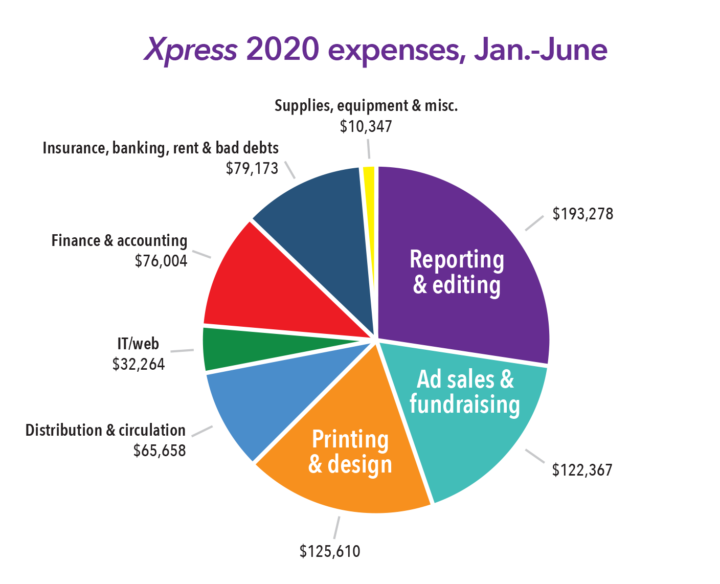Follow the money. Throughout Mountain Xpress’ 25-year run, we’ve tried to follow this classic journalistic advice, tracing the money flows of local governments, organizations and political campaigns. We now turn the reporting lens on ourselves and open our books to show our readers how Xpress works as a business.
Spoiler alert: It’s not working as well as it once did. As local advertisers cope with the ongoing impacts of COVID-19, we’re projecting a $700,000 year-over-year revenue decrease. In response, we’ve been developing new sources of revenue, improving efficiencies and cutting expenses. This is our 2020 midyear report.
Even in our best years, we’ve operated Mountain Xpress similarly to a not-for-profit organization, looking to break even while building a stronger community through journalism — rather than, like typical businesses, seeking a return on investment. Any profits go back into the company to fund our stories, maintain our newspaper racks and boxes, and host our website while keeping it accessible to all, with no paywall or intrusive online ads.
We’re proud that everyone at Xpress earns a living wage, though no one gets a big salary. The ratio of highest-to-lowest-paid is less than 2-to-1, a rarity in American workplaces. Everyone at Xpress makes at least $15.50 an hour, and compensation tops out at $27.50 an hour.
Last year, Xpress’ gross income was $1,860,000 and our expenses came to $1,815,300, leaving a profit of $44,700 (a much-needed cushion for what was to come in March 2020).
Where did that revenue come from? Most of it — 84% — was generated by advertising in our weekly print newspaper. Our pocket (stand-alone) publications, which include the Eats & Drinks, Best of WNC, Field Guide to Asheville and GoLocal guides, kicked in another 11%, with other income sources making up the balance. While some online commenters have scoffed that we’ll “do anything to generate clicks,” the truth is that online advertising contributes only 2% of our annual revenue, and given the hyperlocal nature of our news, there is a limit to how much we can increase this revenue stream.
Where does the revenue go? Overall, reporting and editing account for just over a quarter of our expenses, while design, printing and distribution cost another quarter. Administration and overhead eat up about another 25%. The final quarter pays for the costs associated with ad sales, fundraising and IT/web.
The challenge of 2020
Compared to this time last year, Xpress’ print advertising revenue is down 55%.
Of course, downturns are not new to the newspaper industry. Between 2008 and 2018, American newspapers saw a 68% decline in advertising revenue. That decline impacted Xpress too, but we fared better than most during that period, which in many ways is a testament to Asheville’s vibrant local businesses and their continued support of local journalism.
But this spring’s 55% advertising downturn was different: It was sudden, occurring over the course of just a few weeks, and could easily have spelled disaster had we not adjusted with equal speed. By April 1, we had trimmed operations and shrunk our staff, asking them to become even more efficient. We also reduced our weekly page count, thus lowering print costs.
As a result of all those cuts, we spent $210,000 less in the first half of this year than we did in the first half of 2019. But we are still behind the eight ball and projecting a $93,000 shortfall of revenue against expenses (factoring in grants received and the expected forgiveness of most of our Paycheck Protection Program loan). We’ll apply last year’s $45,000 surplus, which still leaves Xpress $48,000 short of breaking even in 2020.
We’re not throwing in the towel, though. Morale is high overall. But we are looking for help from you, dear reader. With all that has happened so far this year, it remains clear how much communities need good local journalism — to inform, bear witness, hold local leadership accountable, and keep a thoughtful, respectful conversation going.
The bottom line is this: If Xpress is to continue reporting, publishing and distributing in print and online, highlighting the news, arts and culture of this region, that future lies in part in the hands of our readers.
Anyone who values the contents of our weekly community paper owes gratitude to the 700-plus readers who have already supported Xpress by contributing $32,000 so far this year and a big thank-you to the advertisers who have stuck with us since March.
We hope you will pitch in to keep Xpress viable and vibrant.
If you love and value this publication, as we do, please visit SupportMountainX.com to become a monthly member or to make a one-time contribution.






Before you comment
The comments section is here to provide a platform for civil dialogue on the issues we face together as a local community. Xpress is committed to offering this platform for all voices, but when the tone of the discussion gets nasty or strays off topic, we believe many people choose not to participate. Xpress editors are determined to moderate comments to ensure a constructive interchange is maintained. All comments judged not to be in keeping with the spirit of civil discourse will be removed and repeat violators will be banned. See here for our terms of service. Thank you for being part of this effort to promote respectful discussion.